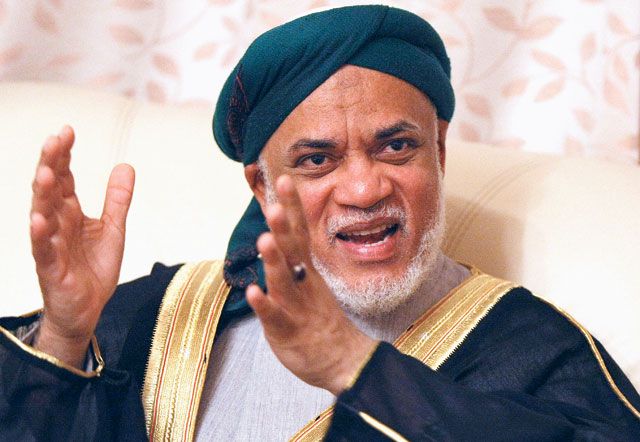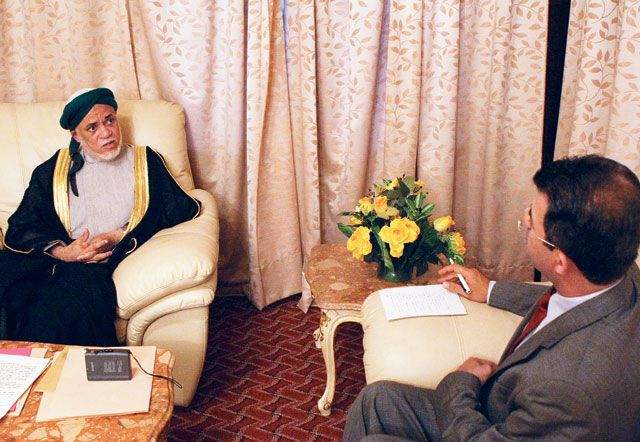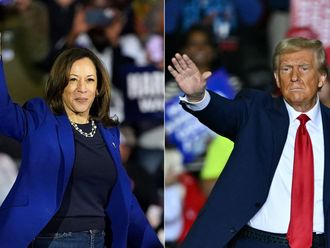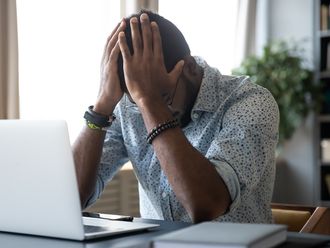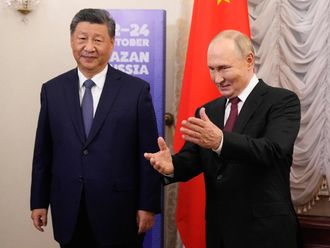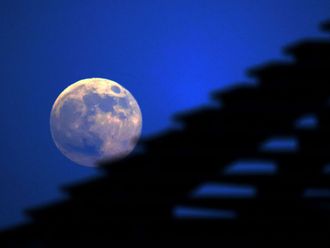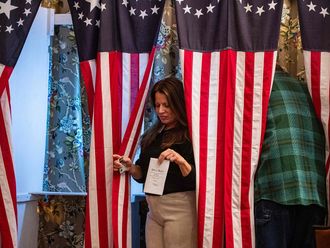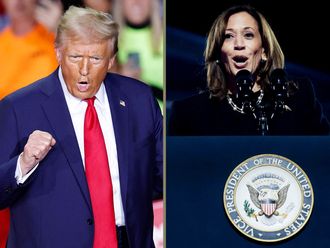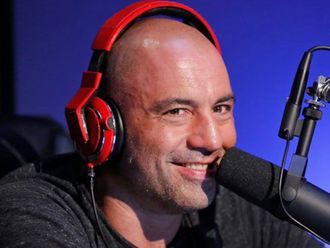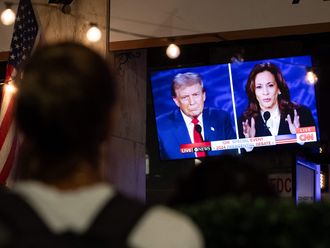With a meagre 40-million euro (Dh218 million) annual budget, there is not much the government of the Union of the Comoros can do. Nevertheless, President Ahmad Abdullah Sambi believes his country can be "turned into a paradise" if Arab states and investors help the tiny Arab island nation politically and financially.
"We need their capital, but more importantly their expertise and political support," he said in an interview at his office in Moroni, the Comoros' capital city.
Sambi, who was elected in 2006, said the era of coup d'etats and political upheavals is a thing of the past in his country. The Comoros witnessed some 20 — often bloody — coups since its independence from France in 1975. With assistance from the African Union, the Comoros last year managed to end an 11-year rebellion in the island of Anjouan.
"There is real stability today," asserts Sambi.
But other challenges remain, he adds, taking note of the urgent need to reform the judiciary and structure the bureaucracy of the federal and local governments.
He also rued the absence of Arab diplomats in his country but for a lone Libyan envoy. "We need the Arabs, we need them to embrace and support us. We are an Arab nation too," he said.
Excerpts from the interview:
Gulf News: Mr President, the country witnessed more than a dozen coups and rebellions in the past which raise serious questions about the stability of the islands and the impact of these political upheavals on development. How do you see the situation today?
President Sambi: Stability is the pillar of any development plan. Without it there will never be any progress. Therefore, since I came to power [in 2006], I made it a priority to consolidate stability. Few years ago, the country witnessed a rebellion, because of the secessionist movement that existed in Anjouan Island. This movement lasted for 11 years. We were able in March 2008 to regain control of the island. We crushed the rebellion and finally put an end to the secessionist movement.
This movement led to the regression of the country and caused many problems. In my opinion, the secessionist movement was tolerated because of the rather unusual nature of the constitution — the country had four presidents, four constitutions, four parliaments and four governments.
Why? There was a president of the union, and each of the three islands had its own president. A small state like the Comoros Islands cannot afford such a division, that is why I presented to the people a constitutional amendment to change that awkward situation and thank God the people approved it.
There is stability in the country today, but there are many things we need to reform and fix. Stability calls for security, civil defence, a modern judicial system. But I can say with full confidence that we regained the trust of the international community. The world has increasingly been interested in our country, for example, beginning with global financial institutions which are showing renewed interest after a whole decade. The IMF has drawn a special development programme for us, which is being monitored.
For thirty years, we have had only one bank. Today, we have three. I also invited the world, especially the Arab world, to come and invest in our country.
We believe in democracy, the system is democratic now. The people will go to the polls on December 6 to elect deputies and the islands' deputies. According to the new amendments, the deputies can impeach ministers and if a two-thirds majority in parliament votes against a minister, the president has to oblige.
We are trying to spread the culture of democracy and peaceful transfer of power. We have to learn that power can only be obtained though the ballot boxes. As you know we had some 20 coups d'etat since the independence in 1975 but we managed to put an end to this malaise.
The Comoros Islands is one of the few states that doesn't have a single political prisoner. We never stopped a newspaper, a radio or television stations in our quest to establish a culture of freedom and democracy.
But some critics still question your move to amend the constitution to abolish the position of the president of each island. The move could be interpreted as a restriction on democracy in the islands in favour of a stronger central government?
Do you think it is viable to have four presidents in such a small place? The constitution says there are presidents; this means they will have their own governments, ministers, whole bureaucracy, etc. It doesn't make sense politically and, most importantly, economically. The Comoros Islands is one of the poorest countries in the world. Our annual revenues are only 40 million euros, mainly from customs and taxes.
Therefore, our top priority now is to attract foreign investors. I appealed to the world to come here to invest in a number of sectors like agriculture, fishing and tourism. Can you believe that we have all this sea and still import the salt, we have all these mango trees and import mango juice. Until recently, we even imported eggs from Yemen for the time Yemen Airline operated flights here.
Without a doubt, investment opportunities are abundant. Look around at the beauty of this country; we need investors to come and tap into the tourism sector.
I think the country was and probably still is little known to the outside world; perhaps the Arab world has just begun discovering the Comoros Islands and I hope this interview will help in increasing awareness.
It is true that the Comoran citizens still suffer from poverty and backwardness, but we hope our Arab brothers would support and help us in the various fields.
What exactly that you are asking from Arab governments and investors?
We need many things. We need the expertise, capital, real cooperation, and real solidarity. I believe that our Arab brothers can really turn these islands into a paradise. They are Arab islands, Muslim islands. We are the only Arab state in this region. It is important that they come here and help us. We need their expertise, we need investments in education, and we need capital to spur business growth. We don't want free gifts or aid; what we are saying is that ‘come here to do business and make a profit.'
To be sure, I can say that the Comoros Islands is a virgin land and any investor who comes here will no doubt thrive.
As for the Arab governments, I call upon them to lend us support, financially and politically. We hope these governments take into account that we have come a long way leaving behind many crises and troubles. Now, we need the expertise of our Arab brothers and their cooperation to boost development here.
The main challenge facing us is that 80 per cent of our budget goes to pay the salaries of government employees. This is a real problem. That means only 20 per cent goes to keep the country functioning, leaving nothing to invest in the country.
Of course this is because the private sector is weak and also because we don't have natural resources. There are no new job opportunities. The newly established bank will hopefully inject some liquidity in the economy. We are trying to lay the foundation and hope things will improve.
How do you see your current relations with other Arab states? Are you happy with the way they are going?
The Comoran people are diverse. They come from different backgrounds, Arab and Africans. We have been accepted in the Arab League. But one should know that there is only one Arab embassy in the Comoros Islands, which is the Libyan embassy. The Arab League has recently opened a mission. But this is not enough. We hope Arab states send ambassadors because the Arab diplomatic absence has a negative reflection on us as a country. This is an important issue. Our Arab brothers probably need to know more about us and I tried to do that in my meeting with other leaders and participation in Arab summits.
We also need the Arabs to support us politically especially with regards to the issue of Mayotte island, a Comoran land, an Arab land that is still occupied [by France]. We are not just after the money but we also need the political support and their expertise. They can for example open their doors to our students to go and study in Arab universities.
In a speech at the UN recently, you presented a plan to end the French occupation of Mayotte island. Have the French responded to your offer?
We have not received any official response. But we learned that some French MPs are seriously studying the proposal. Our offer is that we are willing to give up our right to the island for a period of time; France will continue to administer the island in return for helping us economically. I presented the offer at the United Nations but we have yet to receive their response.
We therefore need the support of Arab states. Perhaps an Arab state can organise a special conference on this issue. Mayotte is an occupied Arab land. We need to highlight this issue just as we do with issues of other occupied lands in Palestine, the UAE islands, etc.
We realise that we cannot regain the island [by force] thus we suggested a rational and reasonable solution.
There is an issue worth highlighting here. The sea between Anjouan and Mayotte has become a cemetery. Since 1994, France has imposed a visa on Comorans who want to visit Mayotte. Since that year, more than 6,000 people died in the sea trying to get to that island by boats. These numbers are cited by French humanitarian groups and nobody talks about this tragedy. Why they are going there? France sends to Mayotte, which has a population of 186,000, more than 700 million euros in aid every year.
On the other hand, our three islands, have a budget of just 40 million euros. Therefore, people think life there is better and try to move there by all means. There are those who go to visit family, or get treatment, or just to find a job.
Fact file
- The Comoros Islands are an archipelago located in the Indian ocean about 480 kilometres west of the northern tip of Madagascar, comprising four islands: Grand Comore, Anjouan, Moheli and Mayotte. Mayotte, however, is occupied by France.
-Total land area of the four islands is 2,236 square kilometres.
- Population in 2009 is estimated at 720,000. The majority (98 per cent) is Muslim. The rest are Catholics or profess other religions.
- The first inhabitants are thought to have been Polynesians and Melanesian settlers. The islands became populated by succession of diverse groups from the coast of Africa, the Arabian Gulf (especially Oman), Indonesia and Madagascar. By the nineteenth century, Sunni Arabs from Shiraz, Iran, had dominated the islands. Since then, the country attracted Bantus, Arabs (from Yemen and other areas), Shirazis, Malagazys and Swahilis. There is no ethnic tension in the country.
- French, Arabic and Shikomoro are the three official languages.
- Gained independence from France in 1975. Joined the Arab League in 1993.
- The constitution was adopted in 2001. It created the Union of the Comoros and gave more autonomy to each of the three islands.
- The 2006 elections, which brought President Sambi to power, was approved as a free, transparent and credible exercise by international observers.
- The May 2009 referendum, the people voted to have one president, one government and one parliament. The president of each island is now called a governor. The government's term was extended to five years.
- The economy is liberal but small and heavily dependent on foreign aid.
- The adult literacy rate was estimated in 2006 to be 74 per cent.
— Gulf News & Ernest & Young


